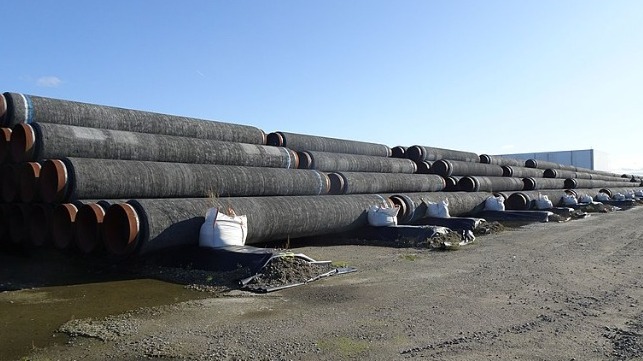Second Pipelay Vessel On Station for Nord Stream 2 Construction

The pipelay vessel Akademik Cherskiy has transited into Danish waters to begin work on the controversial Nord Stream 2 pipeline, joining the sanctioned Russian pipelay barge Fortuna.
In December 2019, Nord Stream 2 lost pipelay contractor Allseas after the U.S. Congress passed a bill that would penalize any pipelay shipowner involved in the project. The pipeline's sponsor, Gazprom, chartered and repositioned two Russian vessels - Fortuna and Akademik Cherskiy - as substitutes for Allseas' world-class equipment. The Fortuna began her work in January, but Cherskiy required an extensive refit, and she began sea trials in the Baltic earlier this month. She has now transited into Danish waters and is holding station near the pipeline route.
Fortuna was sanctioned by the Trump administration for her role in the project. Despite extensive evidence of Akademik Cherskiy's pending involvement, the Biden administration has not yet placed her (or any other new entity) on the Treasury Department's sanctions list.
93 percent of the trans-Baltic pipeline is completed, and less than 100 miles of line is needed to finish it. Last week, Gazprom said that it believes the project will be done by the end of the year.
President Joe Biden and U.S. Secretary of State Antony Blinken have stated that they oppose the completion of Nord Stream 2, but they have a competing priority - a strong desire to restore U.S. relations with Germany. The government of German Chancellor Angela Merkel is committed to Nord Stream 2's completion, as it would give Germany a steady supply of inexpensive Russian gas and make the country into a vital transit hub for gas distribution into the rest of Western Europe.
If completed, Nord Stream 2 would bypass overland pipeline networks in U.S.-allied Ukraine and Poland, giving Gazprom the freedom to shut down gas supplies to these nations at will without affecting Western European customers. Ukraine and Poland are concerned that this frees Russia to use its gas for political leverage, as it has twice before.
Echoing U.S. defense analysts, Poland has also aired the possibility that Russia will covertly install monitoring devices along the pipeline route to collect signals intelligence on submarine operations and shipping. In the event of a conflict, this could pose a risk to U.S.-allied naval and merchant traffic in the Baltic.
In an interview aired on CNN on Sunday, Secretary Blinken reiterated that the U.S. opposes the pipeline, but he declined to say whether the admnistration would take action to stop it. "Well, ultimately that is up to those who are trying to build the pipeline and complete it," Blinken told CNN when asked whether the U.S. could halt the project. "We just wanted to make sure that our position, our opposition to the pipeline, was well understood."
Despite the administration's public reticence to press the issue, recent signaling suggests that the German government may be reconsidering its views. On Wednesday, German Transatlantic Coordinator Peter Beyer called for a construction moratorium on Nord Stream 2 - a first for a senior German federal official.
"The project is a serious stumbling block for the restart of transatlantic relations," Beyer told German weekly WirtschaftsWoche. "The Americans expect us not only to change our rhetoric, but also to let actions speak for themselves. I, therefore, advocate a construction moratorium for Nord Stream 2 . . . European sovereignty must not be misunderstood or reinterpreted as a fortress Europe. Strong Europe - yes. Isolation from the USA - no."
